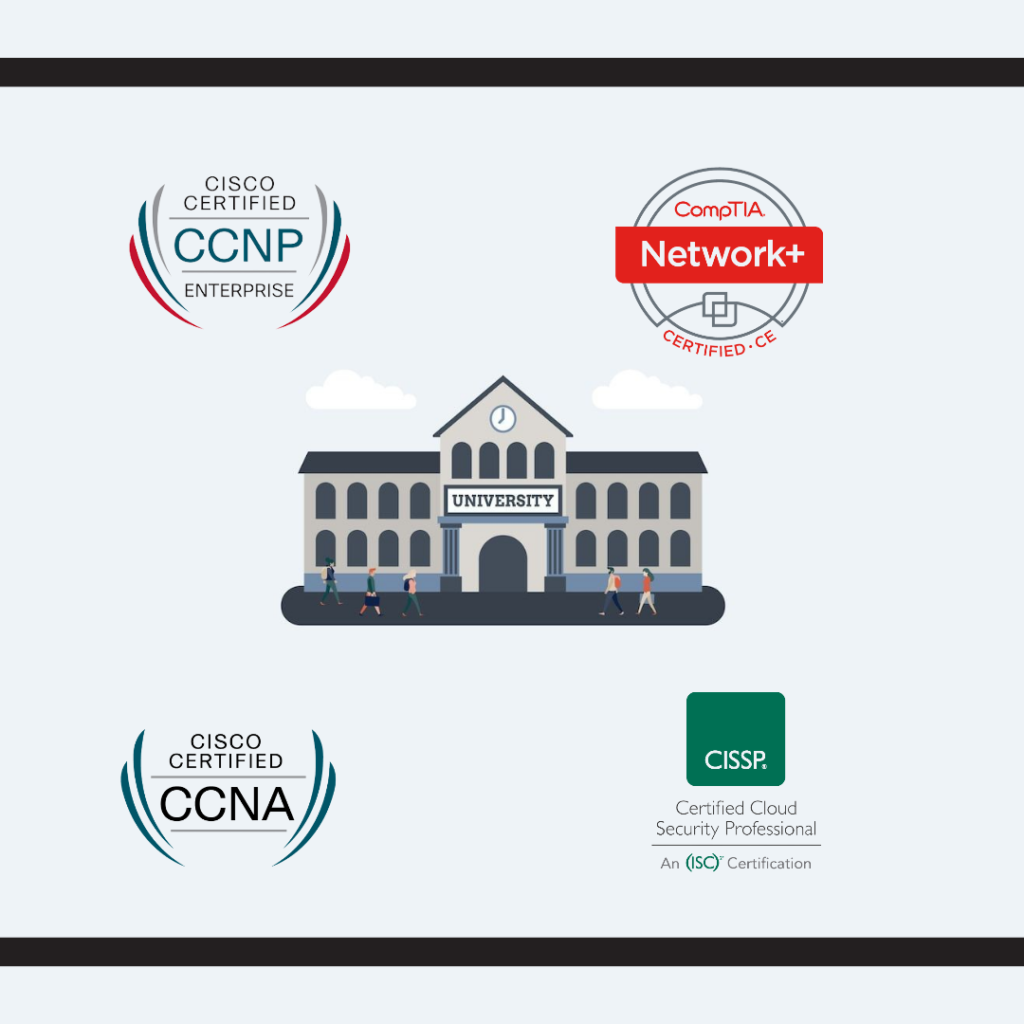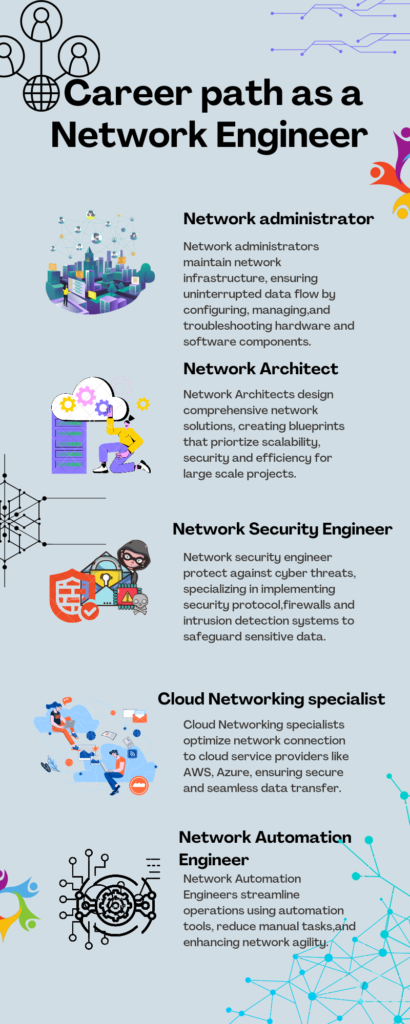
Introduction
The role of a Network Engineers has emerged as an important key to connecting our world, given the evolution of today’s fast-moving Digital World.
Think about it: you rely on the expertise of network engineers who work behind the scenes to ensure that seamless connectivity occurs every time you send an email, record a video, make a voice-over IP phone call, or simply visit one of your favourite websites.
- The Vital Role of a Network Engineers
- The Rising Significance of Networking in the Digital Era
- Surging Demand for Network Engineers
- External Links:
- Skills and Competencies
- Career Paths and Opportunities
- Challenges and Future Trends
- Emerging Trends in Networking
- Day in the life of a network engineer
- Key Takeaways
- Frequently Asked Questions
The Vital Role of a Network Engineers
So, what exactly does a network engineer do? At its core, a network engineer is a digital architect and guardian. These professionals are responsible for designing, configuring, and maintaining the intricate web of data connections that enable our digital lives. They are the heroes who make sure your Wi-Fi signal stays strong, your emails reach their destination, and your sensitive data remains secure.
The Rising Significance of Networking in the Digital Era
Networking can’t be overlooked in a world of increasing interdependence. A paradigm shift has occurred in our way of living, working, and communicating as a result of the digital age. Whether enterprises are using cloud computing services or individuals embracing the Internet of Things IoT in their homes, every aspect of life is dependent on the robustness and reliability of networks.
The digital age is characterized by the use of data for decisions, work at a distance, telemedicine, e-commerce, and the proliferation of intelligent devices.
Networks capable of handling huge amounts of data in an efficient and secure manner are crucial to all these developments. This is where network engineers’ step in, playing a pivotal role in ensuring that our digital infrastructure remains dependable.
Surging Demand for Network Engineers
Demand for network engineers has reached an unprecedented amount as the world becomes more and more digital. Network engineers play an essential role in keeping the operation running smoothly for virtually every industry, from finance and healthcare to manufacturing and entertainment. As businesses recognize the essential role that network engineers play in maintaining continuity and safety, there is a robust but also stable job market for them.
With the rise of remote work, the explosive growth of online services, and the ongoing expansion of 5G networks, the need for skilled network engineers has surged. They are the architects of our digital highways, ensuring that data flows securely and efficiently across vast networks, and they are in high demand in both established industries and emerging tech sectors.
We’ll take a look at the world of network engineering in the pages following, exploring qualifications, skills, and career opportunities that await those who decide to enter this dynamic field. Network engineering may be your pathway to a prosperous future, whether you’re an expert in the field of IT or someone looking for stability and career satisfaction.
So, fasten your seatbelt as we embark on a journey through the world of network engineering, where the digital world meets the real world, and where your expertise as a network engineer can shape the future of connectivity and communication.

External Links:
- Explore Computer Science Programs:
- Link to a reputable website or directory of computer science programs at universities and colleges.
- Example: Explore Computer Science Programs
- Learn About CCNA Certification:
- Link to the official Cisco website or a trusted certification training provider offering CCNA courses.
- Example: Cisco CCNA Certification
- Explore CCNP Certification:
- Link to the official Cisco website or a reputable source providing information on CCNP certification and training.
- Example: Cisco CCNP Certification
- Discover CompTIA Network+ Certification:
- Link to the CompTIA official website or a recognized training provider’s page about CompTIA Network+.
- Example: CompTIA Network+ Certification
- Learn About CISSP Certification:
- Link to the (ISC)² official website or a reputable source explaining CISSP certification and its benefits.
- Example: CISSP Certification – (ISC)²
Skills and Competencies

The network engineers shall be the architects and bodyguards of digital highways connecting our modern world. They need a broad range of skills, both technical and interpersonal if they are to succeed in this constantly evolving field. We’ll be examining the key skills needed to become a successful network engineer in this section.
1. Mastery of Networking Protocols and Technologies
Network engineers must possess a deep knowledge of numerous networking protocols and technologies that underpin the Internet and local networks. These encompass TCP/IP, DNS, DHCP, BGP, OSPF, VLANs, and more. This profound understanding ensures the smooth and secure flow of data across networks.
2. Aptitude for Troubleshooting and Problem-Solving
An essential feature of an excellent network engineer is the ability to diagnose and solve complex network problems. The problem-solving skills of a network engineer are crucial for maintaining the integrity and efficiency of networks, whether it is identifying a sudden decrease in network speed or discovering an undetected security breach.
3. Expertise in security and Firewall Management
In an era of ever-evolving cyber threats, network security takes precedence. Network engineers excel in designing and implementing robust security measures, including firewalls, intrusion detection systems, and encryption protocols. Their responsibility includes safeguarding sensitive data and thwarting unauthorized access.
4. Proficiency in Network Monitoring and Optimization
In order to maintain a healthy and effective network, constant monitoring and optimization are essential. Network engineers are using tools and software that monitor network performance, find obstacles to the allocation of available bandwidth as well and optimize it. This proactive approach ensures that service will not be interrupted or unavailable for a period of time.
The Importance of Soft Skills: Communication and Teamwork
In addition to technical skills, network engineers must excel in soft skills such as communication and teamwork. Here’s why these skills are indispensable:
- Effective communication: Network engineers are often faced with explaining technical issues and solutions to non-technical stakeholders. Efficient communications make it possible for all people to understand the status and challenges of the network, as well as propose improvements.
- Strong teamwork: There is rarely a single effort in networking projects. Network engineers cooperate with colleagues, IT teams, and occasionally external suppliers in a variety of ways. Teamwork is a key element for knowledge sharing and cooperation among team members.
In summary, the skills and competencies of a network engineer extend beyond technical prowess. While a deep understanding of networking protocols and troubleshooting is essential, effective network engineers also possess soft skills that enable them to communicate clearly and collaborate seamlessly. This combination of technical and interpersonal abilities makes them indispensable in today’s digital landscape.
Career Paths and Opportunities

Network engineering is a dynamic and exciting field that offers a wide range of career options and areas of expertise to suit diverse interests and abilities. Whether your passion lies in overseeing network operations, developing cutting-edge structures, or enhancing cybersecurity measures, network engineering provides opportunities that are right for you.
1. Network Administrator
Role: Network administrators are the caretakers of network infrastructure. They ensure the smooth operation of networks by configuring, managing, and troubleshooting hardware and software components. Their responsibilities encompass maintaining servers, routers, and switches, and ensuring uninterrupted data flow.
2. Network Architect
Role: Network architects are the visionaries who design comprehensive network solutions. They craft the blueprint for network infrastructure, taking into account factors like scalability, security, and efficiency. They often engage in large-scale projects, such as constructing data centers or transitioning to cloud-based solutions.
3. Network Security Engineer
Role: Network security engineers act as guardians of network safety. They specialize in safeguarding networks against cyber threats. They implement security protocols, firewalls, and intrusion detection systems to protect sensitive data from unauthorized access and cyberattacks.
4. Cloud Networking Specialist
Role: With the surge in cloud computing, cloud networking specialists are in high demand. They focus on optimizing network connections to cloud service providers like AWS, Azure, or Google Cloud. Their expertise ensures secure and seamless data transfer between on-premises infrastructure and cloud platforms.
5. Wireless Networking Expert
Role: Wireless networking experts are responsible for creating and managing wireless networks, including Wi-Fi and cellular networks. They ensure reliable wireless connectivity, particularly in industries such as telecommunications, healthcare, and IoT.
6. Network Automation Engineer
Role: Network automation engineers use automation tools and scripting languages to streamline network operations, reduce manual tasks, improve efficiency, and increase network agility.
In summary, network engineering is a dynamic area that offers a variety of career paths and opportunities. Whether you prefer the hands-on role of a network administrator, the strategic planning of a network architect, or the cybersecurity focus of a network security engineer, there’s a niche for you. In addition, career prospects could be attractive and fulfilling for specialists in emerging areas such as cloud networking, wireless networking, or network automation.
Challenges and Future Trends
Network engineering is a field in constant flux, shaped by both challenges and innovations. As technology evolves, so do the hurdles network engineers must overcome and the opportunities they can seize.
Challenges Faced with the aid of Network Engineers Cyber Threats:
The digital realm is fraught with cyber threats like malware, phishing, and DDoS attacks. Network engineers ought to continually beef up network protection to guard sensitive records and hold commercial enterprise continuity. For example, in 2021, the Colonial Pipeline ransomware assault disrupted gasoline distribution across the East Coast, highlighting the vital role of network protection.
Evolving Technologies: The tempo of technological trade is relentless. Network engineers face the project of keeping up with state-of-the-art networking protocols, hardware, and software programs. For example, the transition to IPv6, with its big cope with area, is an ongoing mission and possibility.
Emerging Trends in Networking
SD-WAN (Software-Defined Wide Area Network): SD-WAN is revolutionizing how companies manage their extensive place networks. It allows for centralized network control, increased agility, and cost financial savings. For example, businesses like VMware’s SD-WAN solution have converted the way companies join far-off places of work and data facilities. https://www.vmware.com/products/sd-wan.html
Edge Computing: As the Internet of Things (IoT) grows, so does the demand for facet computing. This generation brings information processing toward the source, reducing latency and enabling real-time selection-making. For instance, in healthcare, side computing permits brief evaluation of affected person information in scientific devices, improving patient care. https://link.springer.com/chapter/10.1007/978-3-030-60265-9_5
Automation: Automation tools and AI are converting the panorama of community management. Network automation simplifies repetitive tasks, enhances network safety, and speeds up troubleshooting. An example is how cloud carriers like AWS use automation to optimize their network infrastructure for overall performance and efficiency.
Day in the life of a network engineer
A day in the life of a network engineer is dynamic, filled with challenges, problem-solving, and a continuous quest to ensure network reliability and security. Below, I’ll provide a glimpse into the daily routine of a network engineer with real-life examples of challenges they might encounter and the solutions they employ.
Morning Routine: Network Health Check
You begin your day by checking the network’s health. You detect a considerable decrease in network speed reported by one department’s users.
Solution: First, examine network traffic logs and monitoring tools. You determine that a misconfigured switch port is producing a network loop, which is causing the slowdown. To address the problem, you rapidly reconfigure the port.
Mid-Morning Security Check
A suspected intrusion attempt from an unknown source is indicated by a warning on your security dashboard.
Solution: You investigate the alert, track the originating IP address, and discover that it is an unauthorized device attempting to obtain access. To avoid further attempts, you disconnect the device from the network, reinforce firewall rules, and update intrusion detection signatures.
Lunch Break: Collaboration and Updates:
During lunch, you receive an urgent email from a colleague about a planned network maintenance event that may disrupt essential operations.
Solution: You participate in a conference call with your colleague and the network staff. To minimize disruptions, you discuss the potential impact, design a rollback plan, and announce the maintenance window to affected teams.
Afternoon: Network Enhancement
You get complaints about poor VoIP call quality in a remote office.
To diagnose the problem, you use network monitoring tools. You discover that peak-hour bandwidth congestion is generating packet loss. You use Quality of Service (QoS) rules to prioritize VoIP traffic and ensure clear calls.
Late afternoon: Project Work Challenge
You’re working on a project to modernize the network infrastructure to support a new cloud-based application.
Solution: You work with the project team to plan and execute the migration. You configure VPNs, optimize routing, and provide appropriate bandwidth. The migration was successful, and staff can now use the new program with ease.
Evening: Security Patching
Security warnings identify significant vulnerabilities in network devices that require prompt fixing.
Solution: You schedule a maintenance window during off-peak hours. Patches are applied to impacted devices to ensure they are up to date. This proactive technique protects the network from potential cyber threats.
Late in the evening: On-Call Duty
As the on-call network engineer, you receive an alert suggesting a core router failure.
A day in the life of a network engineer is never dull. It involves addressing a wide range of challenges, from troubleshooting network issues and maintaining security to optimizing network performance and managing projects.
Network engineers play a vital role in ensuring that organizations’ digital infrastructure runs smoothly, and their ability to adapt and solve complex problems is at the core of their value to any organization.
Key Takeaways
The key takeaways from the day in the life of a network engineer are:
- Dynamic Role: A network engineer’s day is dynamic, involving a wide range of tasks and challenges, from troubleshooting technical issues to planning and executing projects.
- Problem-Solving Skills: Network engineers rely heavily on their problem-solving skills to diagnose and resolve network issues promptly. They must think on their feet to maintain network integrity.
- Security is Paramount: Network engineers play a critical role in network security. They constantly monitor for potential threats, respond to alerts, and implement measures to safeguard against cyber attacks.
- Collaboration and Communication: Effective communication and collaboration are crucial. Network engineers work closely with colleagues, other IT teams, and stakeholders to plan, execute, and communicate network changes and maintenance.
- Proactive Maintenance: Network engineers engage in proactive measures, such as patching and updating, to prevent potential issues and ensure the network operates securely and efficiently.
- On-Call Responsibilities: Network engineers often have on-call duties, which means being available outside of regular hours to address critical network emergencies.
- Adaptability and Continuous Learning: Keeping up with evolving technologies and best practices is essential in the field of network engineering. Engineers must be adaptable and committed to continuous learning.
- Critical Role in Business Operations: A network engineer’s work directly impacts an organization’s ability to function effectively. They ensure that employees have reliable access to the tools and resources they need to perform their jobs.
- Balancing Technical and Soft Skills: Network engineers require a balance of technical proficiency and soft skills like communication, teamwork, and problem-solving to excel in their roles.
- To know more about careers https://futurereadytools.com/
Overall, a network engineer’s role is pivotal in maintaining the connectivity and security of an organization’s digital infrastructure, making them invaluable members of any IT team. Their ability to tackle challenges head-on and adapt to new technologies positions them as essential contributors to an organization’s success.
Frequently Asked Questions
- What is a network engineer?
A. A network engineer is responsible for designing, implementing, and maintaining computer networks. They work with a variety of networking equipment, including routers, switches, and firewalls, to create networks that are reliable, secure, and efficient.
2. What are the different types of network engineers?
A. There are many different types of network engineers, each with their own specialized skills and knowledge. Some common types of network engineers include:
- Local area network (LAN) engineers: LAN engineers design and maintain the networks that connect computers and devices within a small geographic area, such as an office or school.
- Wide area network (WAN) engineers: WAN engineers design and maintain networks that connect computers and devices over long distances, such as the Internet.
- Network security engineers: Network security engineers design and implement security measures to protect networks from unauthorized access and attacks.
- Cloud network engineers: Cloud network engineers design and manage networks in the cloud, such as Amazon Web Services (AWS) or Microsoft Azure.
3. What education and training do I need to become a network engineer?
A. Most network engineers have at least a bachelor’s degree in computer science, information technology, or a related field. Many network engineers also have professional certifications, such as the Cisco Certified Network Associate (CCNA) or the Cisco Certified Network Professional (CCNP).
4. What are the skills and qualities that a good network engineer needs?
A. Good network engineers have a strong understanding of networking concepts and technologies. They are also able to troubleshoot problems effectively and work independently as well as part of a team. Other important skills and qualities for network engineers include:
- Problem-solving skills: Network engineers must be able to identify and troubleshoot problems with networks.
- Communication skills: Network engineers must be able to communicate effectively with both technical and non-technical audiences.
- Teamwork skills: Network engineers often work as part of a team with other network engineers, system administrators, and other IT professionals.
5. What is the job market like for network engineers?
A. The job market for network engineers is expected to grow faster than average in the coming years. This is due to the increasing reliance on networks in all aspects of our lives, from business to education to personal use.
6. What is the salary for a network engineer?
A. The salary for a network engineer varies depending on experience, location, and other factors.
7. What are the career advancement opportunities for network engineers?
A. Network engineers have many opportunities for career advancement. They can move into more senior roles, such as network architect or network manager. They can also specialize in a particular area of networking, such as network security or cloud networking.
8. What are the most common networking tools and technologies that network engineers use?
A. Some of the most common networking tools and technologies that network engineers use include:
- Routers: Routers connect different networks and allow devices on different networks to communicate with each other.
- Switches: Switches connect devices on the same network and allow them to communicate with each other.
- Firewalls: Firewalls protect networks from unauthorized access and attacks.
- VPNs: VPNs create secure tunnels over the internet that allow devices to communicate with each other as if they were on the same network.
- Cloud networking technologies: Cloud networking technologies allow businesses to create and manage networks in the cloud.
9. What are the biggest challenges facing network engineers today?
A. Some of the biggest challenges facing network engineers today include:
- The increasing complexity of networks: Networks are becoming increasingly complex as businesses adopt new technologies, such as cloud computing and virtualization.
- The growing threat of cyberattacks: Network engineers must be constantly vigilant against cyberattacks, such as malware and ransomware.
- The need to keep up with the latest technologies: Network engineers must constantly learn about and adopt new technologies to keep their networks secure and efficient.
10. What are some tips for becoming a successful network engineer?
A. Here are some tips for becoming a successful network engineer:
- Get a strong education and training: A strong foundation in networking concepts and technologies is essential for success in this field.
- Get certified: Professional certifications can help you stand out from other candidates and demonstrate your skills to potential employers.
- Gain experience: The best way to learn is by doing. Look for opportunities to gain experience with networking equipment and technologies in a professional setting.
- Stay up-to-date on the latest technologies: The field of networking is constantly evolving.




